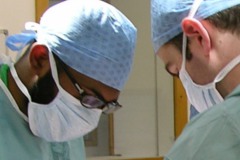Pelican Cancer Foundation receives no government funding for its vital research work.
We rely on the generosity of individuals, trusts and organisations to support our work.
Our latest annual accounts give details of how we spend our income.
We work hard to ensure that every penny of your donation is spent as effectively as possible to advance the aims of the Pelican Cancer Foundation. If you currently donate to Pelican or are considering donating, here are some examples of what your donation could be spent on:
- £5 would cover the cost of audio visual equipment for a multi-disciplinary meeting
- £50 would cover the cost for a nurse to attend a surgical training day at Pelican, OR for one patient to be recruited onto a research trial.
- £500 would pay for a full day of intensive training for a surgeon
- £5,000 would pay for the installation of a new projector
- £50,000 would pay for a research fellow for one year
Even a small donation can make a big difference – and by signing up to Gift Aid your donation is worth an extra 25%, at no extra cost to you.
